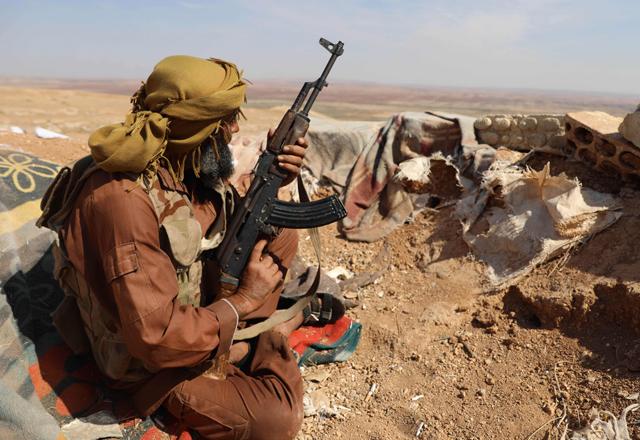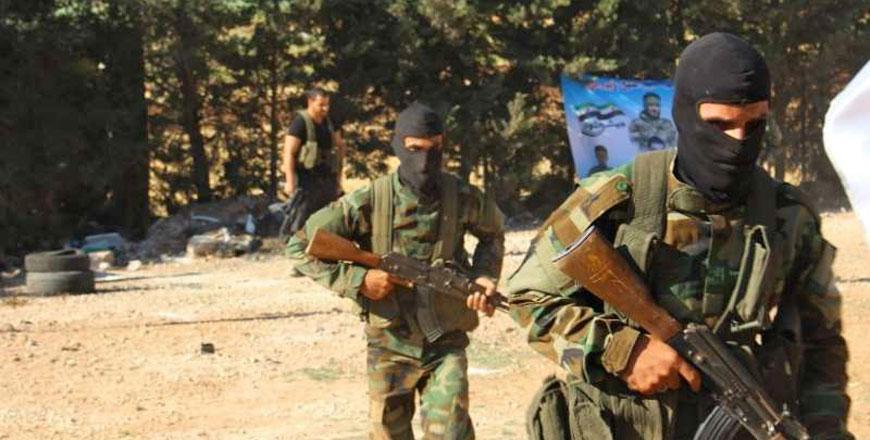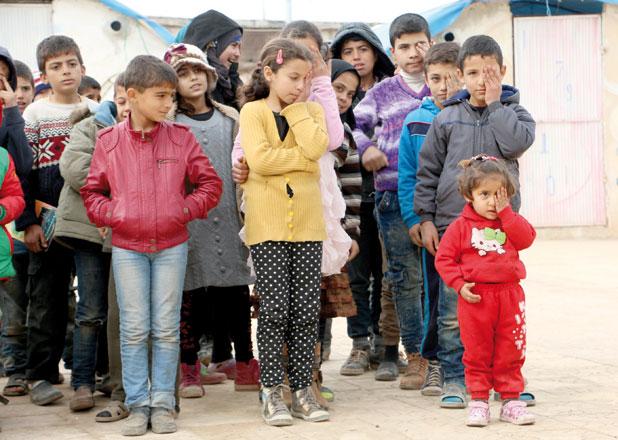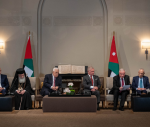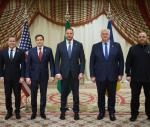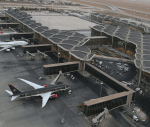You are here
Russia strikes kill 78 Turkey-backed rebels in Syria — monitor
By AFP - Oct 26,2020 - Last updated at Oct 26,2020
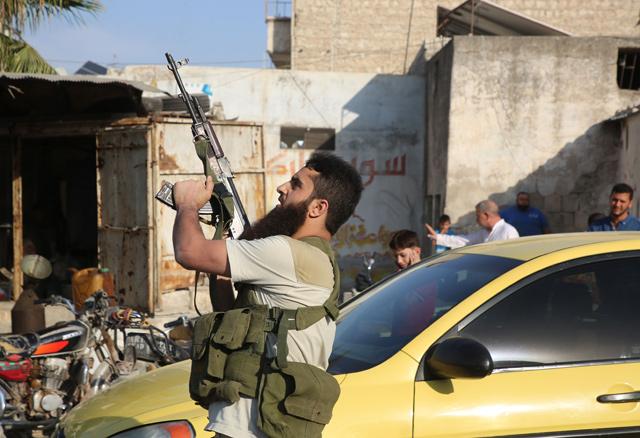
A fighter with the Turkey-backed Faylaq Al Sham rebel faction in Syria shoots in the air during the funeral of 10 of the faction’s fighters in the north-western city of Idlib on Monday (AFP photo)
BEIRUT — Air strikes by Damascus regime ally Russia killed 78 Turkey-backed rebels in north-western Syria on Monday, a monitor said, in the bloodiest surge in violence since a truce almost eight months ago.
More than 90 others were wounded when Russian warplanes targeted a training camp of the Faylaq Al Sham faction in the Jabal Duwayli area in Idlib province, said the Syrian Observatory for Human Rights.
In early March, a truce brokered between Moscow and Ankara stemmed a Russia-backed regime military offensive on the country’s last major rebel stronghold in Idlib.
That onslaught from December had killed more than 500 civilians and displaced almost a million people from their homes in one of the worst humanitarian crises of the nine-year civil war.
Observatory head Rami Abdel Rahman described Monday’s strikes near the Turkish border as the “deadliest since the ceasefire came into force”.
He also said they were the bloodiest Russian air raids against rebels in a single day since Moscow’s military intervention in Syria in 2015.
In Idlib city, an AFP reporter saw dozens attend the funeral of some of the fighters, heads bowed and hands clasped in front of coffins in a neat line.
The National Liberation Front(NLF), an umbrella group of Ankara-backed rebels based in Idlib that includes Faylaq Al Sham, told AFP that Monday’s Russian strikes hit one of its positions and caused casualties.
The group in a statement announced the death of a “large number” of its fighters, and said it would not hesitate to retaliate.
‘Message to Turkey’
NLF spokesman Sayf Raad denounced the “Russian aircraft and regime forces continuously violating the Turkish-Russian deal in targeting military positions, villages and towns”.
The March truce has largely held, despite some intermittent bombardment in the area from both sides.
Russian air strikes have from time to time targeted military positions, including those of Turkey-backed groups, Abdel Rahman said.
Several analysts saw Monday’s raids as a warning to Ankara over Turkey sending its Syrian proxies to fight in the conflicts in Nagorno-Karabakh and Libya.
Some Faylaq Al Sham combatants have individually gone to fight on the Azeri side in the Caucasus, while the faction has sent more fighters to battle in Libya on the side of the UN-recognised government, the observatory says.
Nicholas Heras, of the Institute for the Study of War, said the raid was a message to Turkey’s President Recep Tayyip Erdogan.
Russia’s President Vladimir “Putin is telling Erdogan that he has the ability to strike Erdogan’s favoured Syrian rebel proxies at will inside Syria, if Turkey does not de-escalate its military activities against Russian interests in conflicts in Libya, Syria, and in Nagorno-Karabakh,” he told AFP.
The rebel bastion of Idlib is dominated by Hayat Tahrir Al Sham, led by Syria’s former Al Qaeda affiliate.
Some 3 million people live in the region, around half in camps after being displaced by fighting in other parts of the country.
Of the almost 1 million people displaced in the last Idlib offensive, more than 200,000 have returned home, the United Nations says.
UN envoy visits
Monday’s raid comes after the US army said it carried a drone strike against Al Qaeda leaders in northwest Syria on Thursday last week, with the observatory reporting 17 jihadists killed at a dinner gathering.
Last week, Turkey withdrew from one of its largest outposts in north-western Syria, which regime forces had encircled for the past year.
The outpost in Morek had been Turkey’s largest in Hama province, most of which is now under Syrian government control.
After a string of military victories backed by Russia, the Damascus government controls around 70 per cent of the country, the observatory says.
Syria’s war, which broke out after the brutal suppression of anti-government protests in 2011, has killed more than 380,000 people and displaced millions.
Endless rounds of UN-backed peace talks have failed to stem the bloodshed and in recent years have been overtaken by a parallel negotiations track led by Russia and Turkey.
On Sunday, UN envoy to Syria Geir Pedersen met Syrian Foreign Minister Walid Muallem in Damascus.
Pedersen said they “touched upon all issues related to Security Council resolution 2254” for a political solution to the conflict.
“It’s my hope that meetings we have had today and meetings we will continue to have could be the beginning of something new,” he said.
The UN envoy said he would then hold talks with members of the political opposition.
“Hopefully we can see if it’s possible to find more common ground on how to move this process forward,” he added.
Related Articles
AL EIS, Syria — The withdrawal by rebels of their heavy weapons from a planned buffer zone in north-western Syria is due to last several day
BEIRUT — Conflicting statements were made on Sunday regarding the withdrawal of Pro-Ankara rebels in northern Syria, as one monitor body con
BEIRUT — Air strikes killed 19 people in a village in Syria’s rebel stronghold of Idlib overnight, a rescue service there and the Syrian Obs


